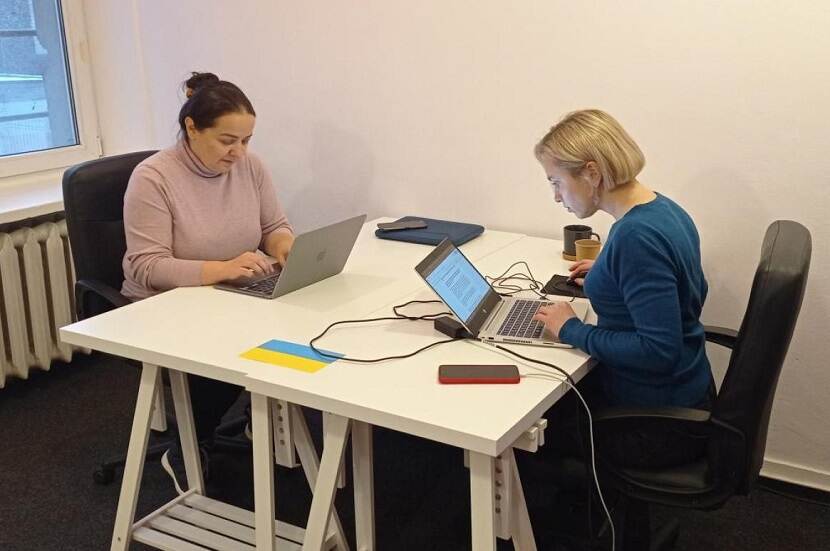‘The war in Ukraine is also an information war’
Weblogs
‘War in Europe and the Fight for the Right to Report’ is the title of the annual report by 15 partner organisations on the subject of journalistic freedom and the safety of journalists. What does Free Press Unlimited do to support Ukrainian women journalists so they can continue their work?
At least 12 journalists and other members of the media have been killed while reporting on the war in Ukraine, and another 21 journalists have been injured. This can be read in the report ‘War in Europe and the Fight for the Right to Report’, which was published on 7 March 2023. Fifteen partner organisations, including Free Press Unlimited, took stock of the state of media freedom and the safety of journalists in 2022. The Dutch Ministry of Foreign Affairs works with Free Press Unlimited to defend freedom of the press worldwide.
Over 11,000 journalists have been accredited by the Ukrainian authorities to report on the Russian invasion. They work under terrible conditions, according to Ruth Kronenburg, the director of Free Press Unlimited. ‘Having to rush for cover when the air-raid siren goes off, dodging random gunfire when you’re trying to cover a story. Most Ukrainian journalists are women – after all, most of the men have been mobilised. Alongside their work they also have to take care of their children. There’s no electricity to stay in regular communication; when the air-raid siren goes off, they don’t know if their kids are safe. And yet, they go on working.’
Kronenburg has nothing but admiration for the Ukrainian journalists she has met. ‘From one day to the next, you suddenly find that you’ve become a war reporter, and you also have to learn how to secure evidence of war crimes.’
Aggression towards the press
Few correspondents are permitted to report from the front line. Those journalists who are allowed need to be extra careful, due to Russian aggression towards the press. ‘The Russians have a list of journalists,’ Kronenburg says. ‘It’s dangerous. Around 48 journalists are missing; it’s unclear if they’ve been taken prisoner by the Russian army, or if they’re even alive.’
Reliable reporting
International organisations support Ukrainian and foreign journalists in the war zone with humanitarian aid, protective equipment and generators, so news editors can continue their work amid power cuts. A week after the Russian invasion, Free Press Unlimited set up Media Lifeline Ukraine so that journalists in and around Ukraine could continue to provide reliable coverage of what was happening. This initiative is now supported by thirty organisations. ‘It’s heart-warming to have so much support,’ Kronenburg says.
Since it was established, Media Lifeline Ukraine has succeeded in helping over 1,000 Ukrainian journalists. For example, it has assisted journalists in relocating, in order to continue their work from safer parts of the country. ‘In addition, we’ve taken 150 bulletproof vests and helmets across the border to journalists who are reporting from the front. We’re also working to ensure the digital security of journalists in the region, for example by providing access to VPNs and offering protection from hackers. This way, journalists can continue to share information with their compatriots, and with the rest of the world. After all, this war is also an information war.’
Censorship
In Russia the start of the invasion was accompanied by a swift crackdown on the free press. Just before the invasion the Russian authorities banned the broadcaster Deutsche Welle. There is also censorship of content: use of the word ‘war’ is prohibited; the invasion must be referred to as a ‘special military operation’. Independent journalists risk a 15-year prison sentence if they do not toe the official line.
Around 7,000 websites are blocked. In their place, the state-controlled Russian media disseminate propaganda. Hundreds of Russian journalists have left the country and now cover the war from abroad. Free Press Unlimited has also helped Russian journalists leave the country.
Safe havens for journalists
After a year, the war in Ukraine is starting to fade into the background a bit. ‘However, there’s still great demand for emergency aid,’ Kronenburg points out. ‘We’ve just sent power banks, bulletproof vests and helmets to Ukraine again, because the power plants are being shelled, and this form of emergency aid is still needed.’ Beyond that, there is also a need for long-term support. For example, in order to set up media hubs in safe areas in the region, places where journalists can work together and receive psychosocial support. ‘We’re hard at work setting up these desperately needed safe havens, in collaboration with Reporters Without Borders and other organisations.’
‘Two hubs in Poland, which we’d initially set up for journalists from Belarus, are now being used by journalists from Ukraine as well. Working from there, a team of Ukrainian women journalists are supporting independent media that are still active in Ukraine.’ Free Press Unlimited continues to do whatever it can to protect journalists and their vital role in society and to provide access to factual, up-to-date and relevant information.
Freedom of expression
Media freedom is under pressure in other countries as well. ‘This war is overshadowing the situation in surrounding countries,’ Kronenburg observes. As the report notes, in addition to the war in Ukraine, there is another war going on in parts of Europe: the war on freedom of the press. In Belarus the Nobel Peace Prize Winner Ales Bialiatski was recently sentenced to 10 years in prison. And in Moldova and Georgia, independent media are also having a tough time.
‘Let’s not forget those journalists,’ Kronenburg urges. Despite all the bad news, Kronenburg wants to conclude on a hopeful note. ‘Despite the fact that Ukraine is at war, it is clinging fast to freedom of expression. Both local and international journalists can generally do their work there despite the war, and that’s something to be thankful for.’
